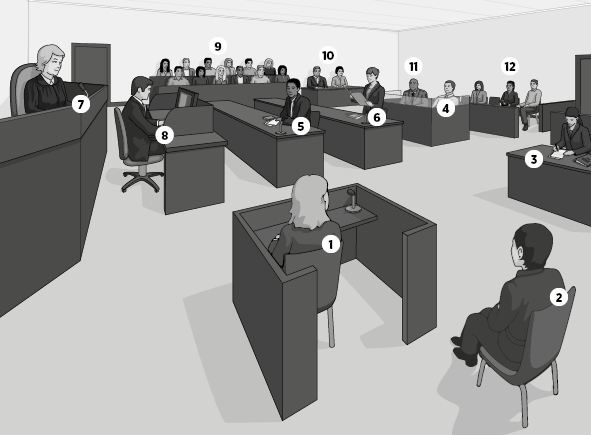Types of trials
There are 2 types of trials:
- judge-alone trials
- jury trials.
Check your summons or with court staff to identify the category of the crime (the offence) you’ve been charged with.
- Category 1 or 2 crimes: For less serious crimes, you have no option other than a judge-alone trial. Depending on the nature of the crime (offence), your case will be heard by either by a judge, justice of the peace or community magistrate. There will be no jury.
- Category 3 crimes: For category 3 crimes (offences), you have a choice of a judge-alone trial, but you could choose to have a jury trial within the District Court.
- Category 4 crimes: If you are charged with a category 4 crime (offence), you’ll likely have a jury trial at the High Court. Members of the public will be summoned to the court to form a jury, to hear the facts of your case. They will then decide if you’re guilty or not.
Find out more about the stages of a jury trial
The different people in the court room
This picture shows the different people who might be in the court room for a criminal case:
- some of the people are part of the hearing, such as the judge, jury and witness
- other people are there to watch the hearing or support friends or family. These people might include the media, members of the public, the victim's family/ whānau and your family/whānau.

Key to people shown in the picture
- Witness or victim – a person who tells the court about what happened or what they know about the case.
- Support person – a person who the judge has agreed can support a witness or victim in court.
- Court victim advisor – a court staff member who helps the victim understand the court process.
- Defendant – the person charged with an offence.
- Prosecutor – the Crown lawyer who is trying to prove if the defendant (you) is guilty.
- Defence lawyer – your lawyer.
- Judge – the person in charge of the court.
- Registrar – the person who makes sure court processes are followed, helps the judge and records what happens in court. The Jury/Court Attendant sits alongside the Registrar. The Jury/Court Attendant is a court staff member who looks after the jury and will oversee them when deliberating.
- Jury –these 12 people decide if you are guilty or not.
- Media – the journalists who report on the case.
- Prisoner’s escort – the person who escorts the defendant in court.
- Public gallery – this is where members of the public sit, including the victim's and your families and whānau. Victims and witnesses can also sit here after they‘ve given evidence, not before.
This page was last updated: